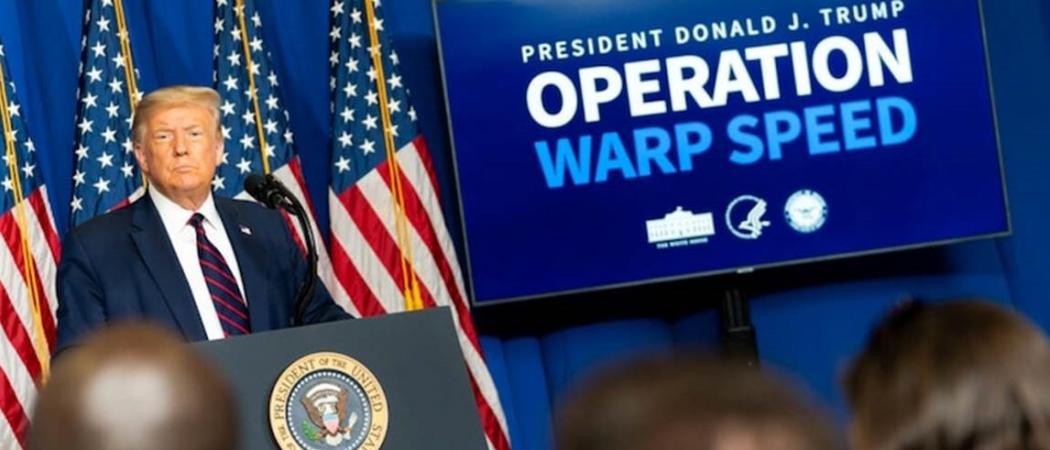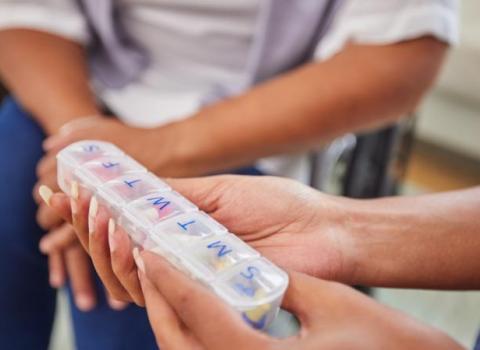US biomedical research body has seen its role grow during the pandemic but has found itself in dispute with the US president. ‘Trump was forced on BARDA, not the other way around’, says one observer

President Trump delivers remarks on Operation Warp Speed. Photo: Shealah Craighead, White House.
Pharma heads in Europe had been calling for the EU to create an agency tailor-made for a pandemic. With the European Commission president Ursula von der Leyen’s pledge on Wednesday to create a new biomedical agency, it seems they will see their wish granted.
AstraZeneca CEO Pascal Soriot and Sanofi chief Paul Hudson were among those saying Europe needed an equivalent to the US BARDA, which made it possible to work with a single agency to negotiate COVID-19 vaccine agreements for the whole of the US.
The Biomedical Advanced Research and Development Authority, its full name, was created in 2006 as a response to the September 11 attacks.
It invests billions of dollars in medical countermeasures to combat a bioterror attacks and pandemic threats, funding drug development projects the private sector won’t touch, including vaccines and treatments for infectious diseases like Ebola, Zika, anthrax, and swine flu.
“It’s an instrument to counter dangerous forces and agents which lack sufficient market incentive,” said Steve Morrison, senior vice president at the Center for Strategic and International Studies, a US-based think tank. “It has developed into an important part of the US health security arsenal.”
The agency has worked with dozens of different suppliers, including major pharmaceutical companies and smaller biotechs. It strikes agreements to cover their production costs, pushing treatments and technologies through the so-called ‘valley of death’, between early discovery research and marketing approvals.
BARDA funding has helped the development of over 50 new molecules, said Morrison. “It’s there to build relationships with industry; convince them to stay in the game, keep them committed and engaged. This is more difficult than many people understand.”
The agency has seen a massive boost in spending power during the pandemic as one of the federal agencies running ‘Operation Warp Speed’, set up by president Donald Trump to incentivise manufacturers, with the aim of getting 300 million doses of COVID-19 vaccines to Americans by January.
“They have distinguished themselves during a difficult period,” said Amesh Adalja, senior scholar at the Johns Hopkins University Center for Health Security.
The EU came up with a makeshift BARDA in recent months, closely modelled on the Warp Speed effort, which aims to secure supplies of potential coronavirus vaccines. Both schemes have resulted in multi-billion dollar contracts for vaccine projects with companies including Moderna, AstraZeneca and Pfizer.
Questionable contracts
But the accelerated COVID-19 timelines has led a former director of BARDA to speak out against the risk of undue political influence on the agency.
Rick Bright was removed from his post in April, and in a formal whistle-blower complaint said that he had been protesting “cronyism” and contract abuse since 2017. Questionable contracts have gone to “companies with political connections to the administration,” the complaint said, including a drug company tied to a friend of Jared Kushner’s, president Trump’s son-in-law and senior adviser.
Bright, who worked at BARDA for 10 years before his abrupt demotion, alleged that he faced retaliation after resisting efforts to promote the use of hydroxychloroquine and chloroquine, unproven and potentially dangerous coronavirus treatments.
“It’s been a tough time for BARDA recently,” said Morrison. “The documentation that came forward, the congressional hearings… all were pretty damning in the degree to which they alleged how funding decisions can be corrupted by political processes. It has been a wake-up call.”
Blame doesn’t lie with the agency, however, according to Adalja.
“We’ve seen a huge level of interference from the president in areas in which he’s unqualified. President Trump was forced on BARDA, not the other way around.”
“Clearly, Trump has diminished the value of all our public health institutions,” he said.
Morrison said that the “shock of COVID-19 is going to lead to a pretty thorough re-evaluation of all our requirements. But I think it’s quite likely BARDA will have much higher budget flows in the future,” he said.
Early jockeying in Europe
The BARDA way of doing things has influenced other major vaccine efforts. The agency’s former head, Richard Hatchett, was chosen in 2017 to run the Coalition for Epidemic Preparedness Innovations (CEPI), one of the most prominent funders of COVID-19 vaccine technologies. “I don’t think his appointment was any coincidence,” said Adalja.
There’s a gap for BARDA in Europe, because existing funding schemes are better suited to the “precompetitive research” stage, “but traditionally not late stage product development,” said Pierre Meulien, director of the EU's Innovative Medicines Initiative, the large public–private partnership for drug development.
Brussels officials have yet to release any details about funding or governance of the European BARDA, but already the jockeying and speculation over which member state will host it has begun, with some member state officials murmuring about early bids.
EU agencies are a fiercely fought-over spoil. For instance, the decision to relocate the European Medicines Agency to Amsterdam from London in 2017, after the Brexit referendum, ended up before the highest court in Europe.
Others say there should be no outsized role for the pharmaceutical industry in the new agency.
“In principle, an EU BARDA is a great idea but it should not become a blank cheque to the pharma industry,” said Yannis Natsis, policy manager, universal access and affordable medicines at the European Public Health Alliance.
Natsis called for the new agency not to “simply fix market failures but steer meaningful innovation driven by public health needs.” Governance has to be “transparent and inclusive”, with taxpayers not just playing a role of “passive donors”.
Before establishing an agency like BARDA, officials should also be clear-sighted about the costs involved, Morrison suggested.
As BARDA has grown, so too has its library of molecules. “As you become more successful, you carry a burden of financing for stockpiling and remaining in some form of readiness. That’s expensive,” he said.
From BARDA to BARPA
Admiration for US institutions is catching in London too, where the government has proposed developing an early-stage “breakthrough” funding body modelled on ARPA-E, a version of the US Defense Advanced Research Projects Agency that backs clean energy projects.
Cambridge University professor Laura Diaz Anadon said this week that the UK’s take on ARPA-E – which has been christened BARPA, the British Advanced Research Projects Agency – should fix its sights solely on boosting new clean tech ideas.
“The clean energy space has a venture capital model that is less proven than, say, the digital tech model. There’s more of an argument for government to de-risk green innovations,” Anadon said.
In new analysis published Monday in the journal Nature Energy, Anadon leads an investigation into the successes and failures of green energy companies in the US, and finds that those with ARPA funding filed “far more patents” in the years after launching than other cleantech companies from the same time. This “innovation advantage” bestowed by ARPA-E was not shared by start-ups funded through other government initiatives.
The findings, she says, “offer encouragement” to setting up a BARPA dedicated to climate change innovation.





 A unique international forum for public research organisations and companies to connect their external engagement with strategic interests around their R&D system.
A unique international forum for public research organisations and companies to connect their external engagement with strategic interests around their R&D system.